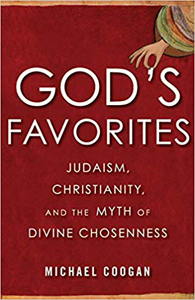 Michael Coogan, God's Favorites: Judaism, Christianity, and the Myth of Divine Chosenness (Boston: Beacon Press, 2019), 170pp.
Michael Coogan, God's Favorites: Judaism, Christianity, and the Myth of Divine Chosenness (Boston: Beacon Press, 2019), 170pp.
One of the most troubling themes in Christianity and Judaism is the scandal of particularity. In the Old Testament, Israel alone is God's elect people: "You only have I known of all the families of the earth" (Amos 3:2). Israel is not only God's special insider community; it is the only insider community. And not long after the time of Jesus, the early Christians viewed themselves as the new Israel that replaced the perfidious Jews, and who alone were the newly and truly chosen people of God (supersessionism).
As Michael Coogan and many others have observed, Jews and Christians are hardly alone in making this sort of claim. Numerous kings and gods have not only claimed to be divinely chosen, they have claimed to be divine. The practical consequences of this view of election have been catastrophic in many times and places: the subjugation and extermination of the "other" who is non-elect, and the confiscation of their land that's claimed to be given to the elect by God. After an introductory chapter, Coogan documents this view among ancient Jews (chapters 2-5), early Christians (6), other faiths (7), the Puritan settlers of America (8), and then in Jewish and American "ultra-religious Zionists" (9). In his last two chapters he considers the role of immigrants and refugees in the Bible, and makes an appeal to end our tribalisms (10-11).
Coogan's answer to the scandal of particularity is simple: he dismisses it as a myth, that is, as "something that is not true." Rather, all claims to be divinely chosen and even divine are "a self designation for political and personal aggrandizement." Today we dismiss the claims of divine election that were made by the ancient Hammurapi, Egyptian pharaohs, Julius Caesar, Charlemagne, Napoleon, and many others (46-49), and we should do the same with Jewish and Christian clams.
Coogan's book is unapologetically dismissive. The ancient Yahweh is a "bloodthirsty" God with an "inferiority complex." He acknowledges that the Jewish and Christian Scriptures contain major themes of inclusion and universality, but he never considers these at any length (58-59). To take just one example, when God chose Abraham to form one, particular nation, his election of Israel did not mean his exclusion of Gentiles. In fact, quite the opposite. God said that he would bless not only Abraham's progeny, but "all peoples on earth" (Genesis 12:3, 22:18). When God repeated his covenant with Isaac, he reiterated his intentions for all the world: "in you, Isaac, all nations on earth will be blessed." (Genesis 26:5). And when Isaac's son Jacob used a rock for a pillow and dreamed a dream at Bethel, God repeated verbatim: "In you, Jacob, all peoples on earth will be blessed." (28:14). Coogan reminded me of the saying that when all you have is a hammer, every problem is a nail.
In his introductory chapter, Coogan confers upon himself the mantle of scholarly objectivity, denies it to others, and admits that he has a polemical purpose. He explains that the post-Enlightenment historical critical method rightly displaced the Bible from its "privileged" status in favor of a "more objective approach." Further, other scholars "have not set aside their presuppositions." They let their faith taint their scholarship, and so they attain only "professed objectivity," even though he admits that it's "a debatable notion that one can be objective," and that "complete objectivity is impossible." But this is precisely what he claims for his own work: "I am fairly confident that I have brushed away the cobwebs of dogmatism and set aside my own presuppositions" (8). Finally, he says that he attained such scholarly objectivity when he shed his Catholic faith and "stopped believing in the biblical god, or in any god. I left my swaddling clothes behind."
For more on this important subject I commend the works by Frank Anthony Spina, The Faith of the Outsider; Exclusion and Inclusion in the Biblical Story (2005); Miroslav Volf, Exclusion and Embrace: A Theological Exploration of Identity, Otherness, and Reconciliation (1996); Amartya Sen, Identity and Violence; The Illusion of Destiny (2006); and The Conquest of America: The Question of the Other (1982) by Tzvetan Todorov.
Dan Clendenin: dan@journeywithjesus.net


